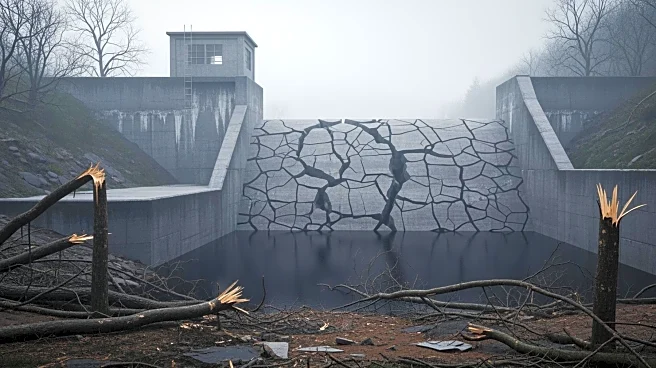What's Happening?
A London judge has ruled that BHP Group, a global mining company, is liable for the catastrophic dam collapse in Brazil that occurred a decade ago. The disaster released tons of toxic waste into the Doce
River, killing 19 people and devastating nearby villages. High Court Justice Finola O'Farrell found BHP responsible due to negligence and lack of skill, despite not owning the dam at the time. BHP owns 50% of Samarco, the Brazilian company operating the iron ore mine where the dam ruptured. The collapse resulted in significant environmental damage, with sludge destroying the village of Bento Rodrigues and contaminating the river, which remains polluted with heavy metals. The ruling is seen as a historic victory for the victims seeking justice, with the judge agreeing that BHP was heavily involved in the operation and could have prevented the disaster.
Why It's Important?
The ruling against BHP Group is significant as it holds a major mining company accountable for environmental negligence, setting a precedent for corporate responsibility in ecological disasters. The decision impacts BHP financially, with claimants seeking $47 billion in compensation. It also highlights the ongoing struggle for justice by affected communities, emphasizing the need for stringent environmental policies. The case underscores the importance of corporate accountability in preventing foreseeable disasters and protecting vulnerable communities. The ruling may influence future legal actions against corporations involved in environmental damage, potentially leading to stricter regulations and oversight in the mining industry.
What's Next?
BHP plans to appeal the ruling, which could prolong the legal process. The next phase of the trial will determine the damages owed to the claimants. Meanwhile, the Brazilian government has reached a multibillion-dollar settlement with Samarco, which agreed to pay $23 billion over 20 years for damages. The outcome of the appeal and subsequent legal proceedings will be closely watched by stakeholders, including environmental advocacy groups and affected communities. The case may prompt further scrutiny of mining practices and encourage reforms to prevent similar disasters in the future.
Beyond the Headlines
The ruling against BHP Group highlights broader ethical and legal implications regarding corporate responsibility and environmental stewardship. It raises questions about the balance between industrial growth and ecological protection, especially in regions vulnerable to environmental degradation. The case may influence global discussions on sustainable mining practices and the role of corporations in safeguarding natural resources. It also reflects the challenges faced by indigenous communities in preserving their cultural heritage and environment amidst industrial expansion.










